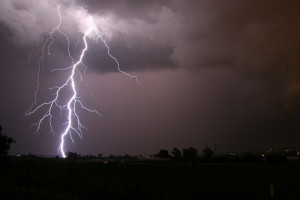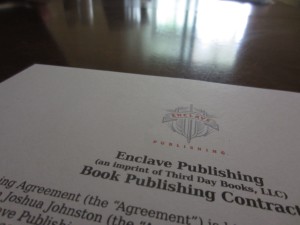 The odyssey behind Edge of Oblivion began fifteen years ago, when I inadvertently destroyed a computer.
The odyssey behind Edge of Oblivion began fifteen years ago, when I inadvertently destroyed a computer.
It was a cold, unassuming Saturday morning, and I had just purchased a stick of memory for my year-old desktop computer. After dutifully discharging a finger against metal to rid myself of static electricity, I installed the stick, replaced the cover, and hit the power button.
The computer would not boot.
Miffed, I put the old memory back in. It still would not boot.
Thus began an agonizing sequence of events that included a phone call to the computer manufacturer’s tech support, at least a dozen fruitless attempts to shuffle the various memory sticks around, and a lot of staring at the computer, as if I could will it to start. It would be a few weeks before a friend of mine who built computers did a postmortem on it and determined that the motherboard of my fairly expensive, relatively new PC had been completely fried.
It was almost certainly my fault. In hindsight, I realized I had been wearing flannel pajama pants that morning, and while I had discharged static on nearby metal, it is likely that the flannel continued to draw a charge through its contact with the carpet. I somehow managed to send a current through the entire motherboard.
The loss of the computer left something of a vacuum in my spare time. I was a young college graduate, single and living by myself, and the PC was one of my very few sources of entertainment. I quickly found myself not sure what to do. And then it hit me: maybe I should put this time to productive use. Doing what? I asked myself.
I took stock of what I had in my apartment. Looking into the spare bedroom, I spotted the ancient PC that my just-fried computer had been purchased to replace. The ancient one was too old to do just about anything other than basic word processing; even surfing the internet was beyond it.
I could write, I thought. A novel. I could write a novel. The idea seemed whimsical and even a little ridiculous, but since I couldn’t think of anything more interesting to do, I did.
I quickly settled on my favored genre, science fiction. Digging out a notepad, I sketched out ideas for an epic space trilogy: the setting, the characters and their backgrounds, and an outline of a plot set far into the future that involved extraterrestrials, space travel, and a fight against a terrible, powerful evil. I followed up by drafting a manuscript, initially on that old PC, and then later on the computer that replaced the fried one. That manuscript was followed by a second, and a third. A few years later, I’d written a draft of a trilogy.
Then life intervened… to the tune of almost a decade. I met my future wife. My day job as a high school teacher introduced some wrinkles that drew away much of my creative energies. I got married. My wife and I moved into a house and had two daughters. I took up work writing nonfiction, as a writer and later editor for the video game site Nintendojo. The manuscripts, all the while, were buried in a collection of folders that migrated from computer to computer, from hard drive to hard drive.
During that time, I wrote no fiction. My understanding of writing, though, was not idle; while the books went fallow, I kept reading science fiction, and, as Stephen King famously noted, that is important. As a kid, I had read plenty of science fiction. As an adult, I became more aware as to what science fiction novels were good … and what, exactly, made them good. I mulled over what things, both big and little, that the great writers did that made them great.
And so it was that, a few years ago, I finally got the inkling to go and peek at my long-dormant manuscripts. I read the first book, then skimmed over books two and three.
My assessment: most of it was pretty terrible. But beneath that was a core of promise. A lot of the underlying premise still resonated with me, even if I cringed at the execution. Somewhere in that mess, I thought, were interesting characters and a universe worth exploring. To that end, I did two things:
One, I went back to he master document I’d kept of background notes — plotlines, characters, sociologies, technologies, etc. — and started my rewriting there, bringing the old ship up to speed with my evolved thinking.
Two, I started the long journey of rewriting the science fiction trilogy from the ground up.
The first book – whose original title was so bad I won’t repeat it here – got a new working title in World of the Dead. That title was itself later replaced after someone sagely pointed out that World of the Dead might give the wrong impression about the book’s genre, especially given the recent proliferation of all things zombie apocalypse. In the brainstorming that followed, the manuscript received its current title, Edge of Oblivion.
Writing – or, rather, rewriting – the manuscript took about a year. As that drew to a close, a few people who knew about the effort started prodding me to do something with it. You went to all that trouble over the years, they said: why not see where it takes you? I took the advice, soliciting a varied group of beta readers who, in turn, gave me crucial guidance as I revised and fleshed out the parts of the manuscript that needed it. What started out as a hobby was now starting to look like – dare I say it? – a real novel.
 In the spring of 2015 I started pitching the manuscript to publishers… and a quiet May evening got considerably more interesting when I was contacted by Enclave Publishing and offered a three-book contract. The rest, as they say, is history.
In the spring of 2015 I started pitching the manuscript to publishers… and a quiet May evening got considerably more interesting when I was contacted by Enclave Publishing and offered a three-book contract. The rest, as they say, is history.
Edge of Oblivion releases in both paperback and digital forms on April 15, 2016.




